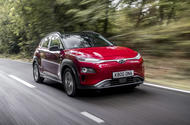UPDATED: Range estimates are exactly that – estimates. We show you what you can expect from an EV in the real-world
Battery technology and charging infrastructure is constantly improving, quickly turning EVs from niche vehicles to a viable replacements to combustion-engined cars. But how far you can drive between top-ups is still a valid concern.
Manufacturer range estimates vary wildly, and aren’t always achievable in everyday driving conditions – so how far can you really go on a single charge? Our sister site What Car? puts every electric car through a range test, measuring exactly what kind of distance you can achieve in the real world.
The ten cars listed here have the longest range capability of all the electric cars we have tested to date.
1. Hyundai Kona Electric, 259 miles
Our current long-distance champion for electric range isn’t the car with the biggest battery, and nor is it the most expensive. That it comes from a mainstream brand rather than a luxury one and can be had for under £35,000 speaks volumes for EV adoption.
When we road tested the Kona Electric last year, we said it offered “the most compelling blend of usability and affordability yet seen in an EV,” and with a real-world range of over 250 miles from a 64kWh battery, it bests premium names like Tesla, Jaguar and Audi.
In fact, its combination of price, performance and popular compact crossover bodystyle have proved so in demand that Hyundai is struggling to meet demand.
Read the full Hyundai Kona Electric review here
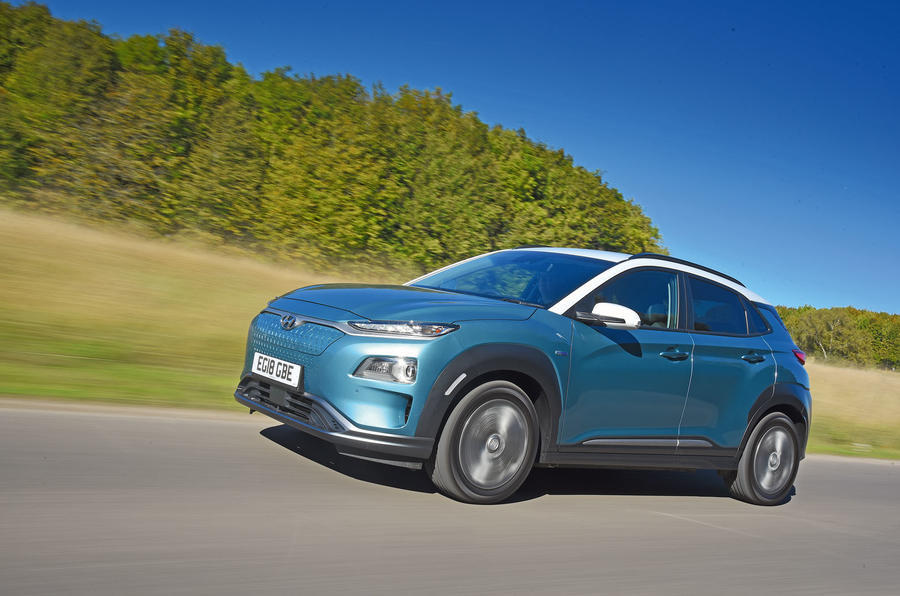
=2. Jaguar I-Pace, 253 miles
As the first European carmaker to release a premium model to challenge the likes of Tesla, Jaguar beat its closest rivals to the punch, while also setting a high bar for them to follow. It is a true driver’s car that happens to be powered by electricity, with impressive amounts of acceleration and the kind of handling you expect from the brand.
With a 90kWh battery powering its twin electric motors, the I-Pace achieves a real-world range of 253 miles. That narrowly puts it into second place behind the Kona Electric, but with support for faster DC rapid charging, it may spend less time plugged into a compatible charging point to regain any lost range.
Read the full Jaguar I-Pace review here

=2. Kia e-Niro, 253 miles
Sharing the second row of the podium with the I-Pace, the Kia e-Niro also manages 253 miles of range – despite having a significantly smaller battery than the Jaguar. It shares its powertrain with the Hyundai Kona Electric, but has a slight weight penalty on account of its larger body.
When we road tested the e-Niro, we decided the slight reduction in total range was worth the gains in usability, refinement and ride quality, earning it a higher overall score.
Read the full Kia e-Niro review here
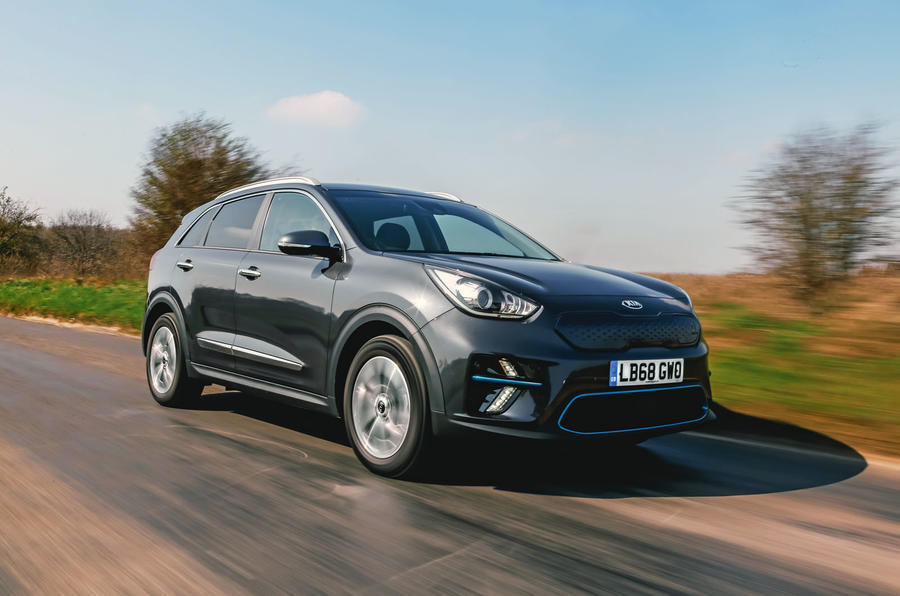
4. Tesla Model 3, 239 miles
The long-awaited mainstream Tesla model only recently arrived in the UK, after a year of massive sales success in the USA. The Model 3 is available in Standard Range Plus specification, or with BMW M3-baiting power and acceleration in Performance guise, managing the 0-60mph sprint in 32 seconds and a 162mph top speed thanks to an electric motor on each axle. It was this version we tested, with the optional performance pack adding larger 20in wheels over the standard, aero-optimised 18in alloys.
In our tests, the Model 3 Performance achieved 239 miles of real-world driving. That puts it beyond the longest range Model X, which costs significantly more, and comfortably ahead of the Audi E-tron electric SUV.
Read the full Tesla Model 3 review here
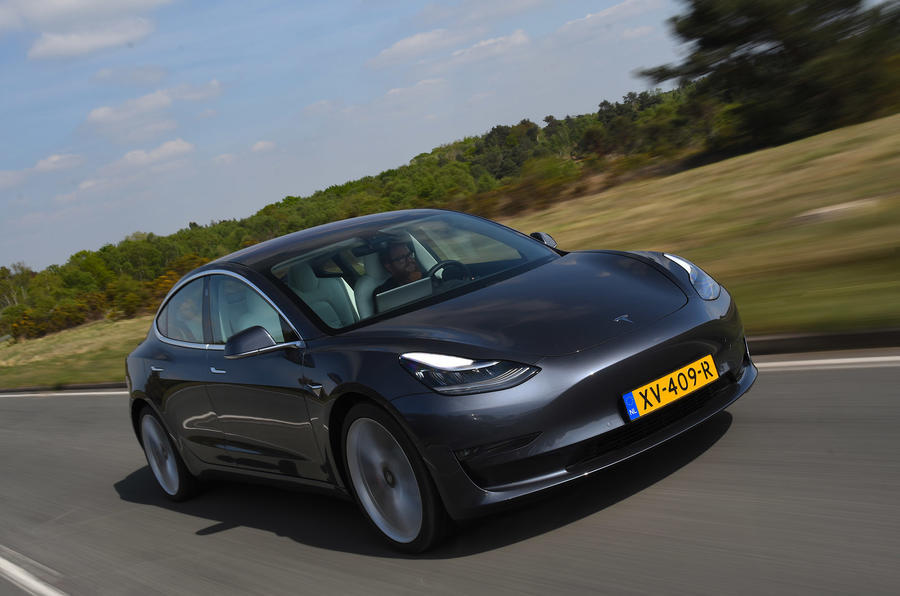
5. Tesla Model X, 233 miles
The second Tesla car to make it to the UK in volume numbers, the Model X combines seven seat practicality with attention-stealing gullwing doors and near-supercar levels of acceleration once the optional Ludicrous Performance mode has been added. It also demands a near £100,000 asking price, making it one of the most expensive EVs on Britain’s roads.
When we tested the X in P100D guise, before the company shook up its model naming conventions, it managed a competitive 233 miles of range. While this puts it below the very best, Tesla’s supercharger network promises some of the fastest destination charging times currently available in the UK.
Read the full Tesla Model X review here
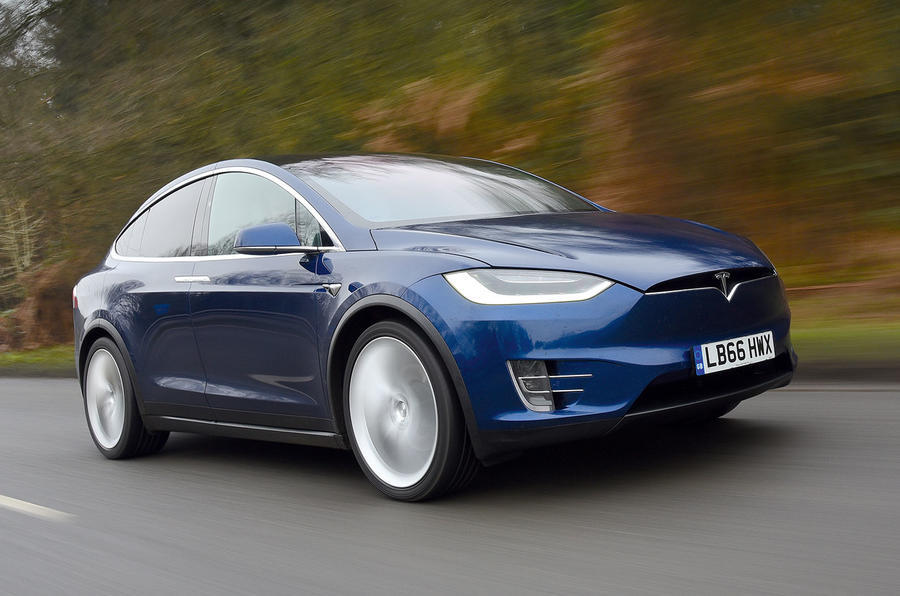
6. Tesla Model S 75kWh, 204 miles
The original electric luxury saloon, the Model S proved that Tesla could turn its hand to volume production and set new standards for the distance an EV could travel on a single charge when it first made its debut back in 2012.
It is now available in a choice of different battery capacities, with the current entry-level 75kWh model managing 204 miles of real-world range. That no longer puts it at the top of the list, but with access to a plentiful network of Superchargers, owners may find themselves spending less time recharging than they might in a rival EV.
Read the full Tesla Model S review here
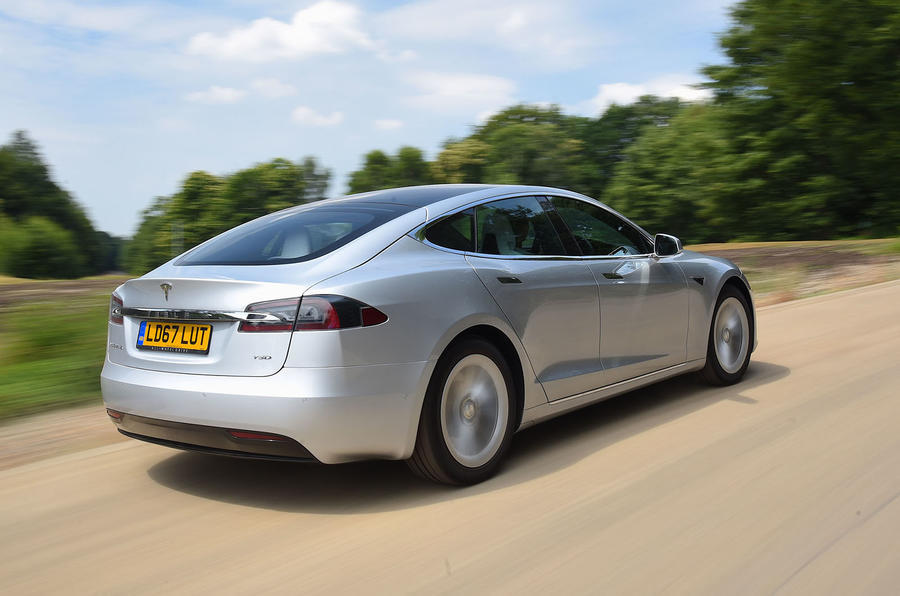
7. Audi e-tron, 196 miles
Audi had experimented with electric versions of its existing models before, but the e-tron is the first of a new generation, and potentially one of the brand’s most important cars for years.
It’s a luxury SUV first and an electric one second, but with styling that doesn’t set it far apart from combustion-powered models. It is heavy, however, and even though it has a large 95kWh battery pack, drivers can expect a real-world range of around 196 miles. On the plus side, support for 150kW charging (when it arrives in greater numbers) should speed up any downtime.
Read the full Audi e-tron review here
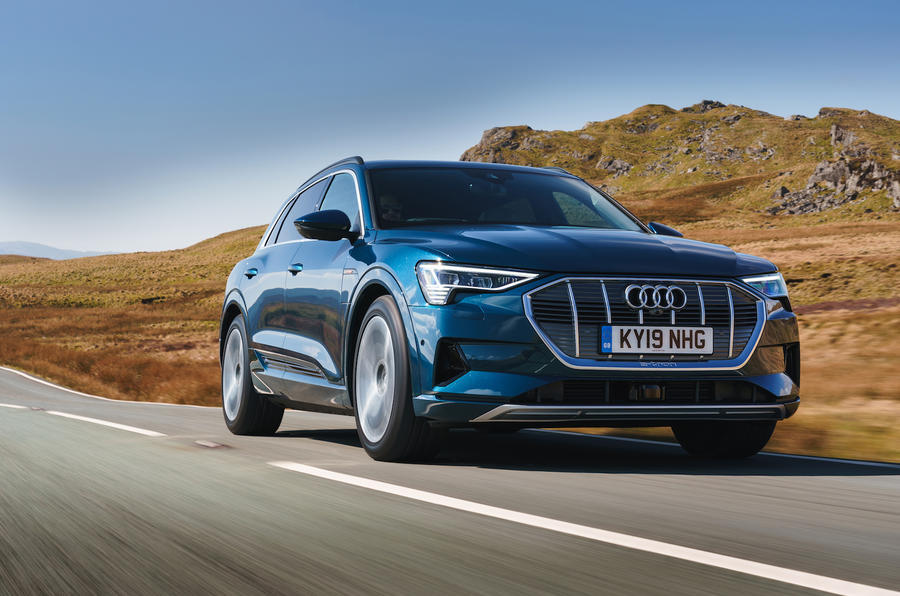
8. BMW i3 120Ah, 165 miles
The i3 was one of the first modern electric cars, and a demonstration from BMW that they didn’t need to follow the same formula as the combustion vehicles they are expected to replace. An unusual design, minimal interior and the kind of handling expected of the brand helped earn the i3 a five star road test verdict when it first arrived back in 2013.
A mid-life facelift and a higher density battery pack have helped keep the i3 relevant today as a premium compact EV, but a real-world range of 165 miles may rule it out of intercity journeys without also factoring in a charging stop along the way.
Read the full BMW i3 review here

9. Hyundai Kona electric 39kWh, 158 miles
The second Kona to make this list is more affordable, because it opts for a much smaller capacity battery. At 39kWh, it’s a third smaller than the car that currently tops our list, and as such you can expect a significantly lower real-world range. In our tests, we saw an average of 158 miles.
Read the full Hyundai Kona Electric review here
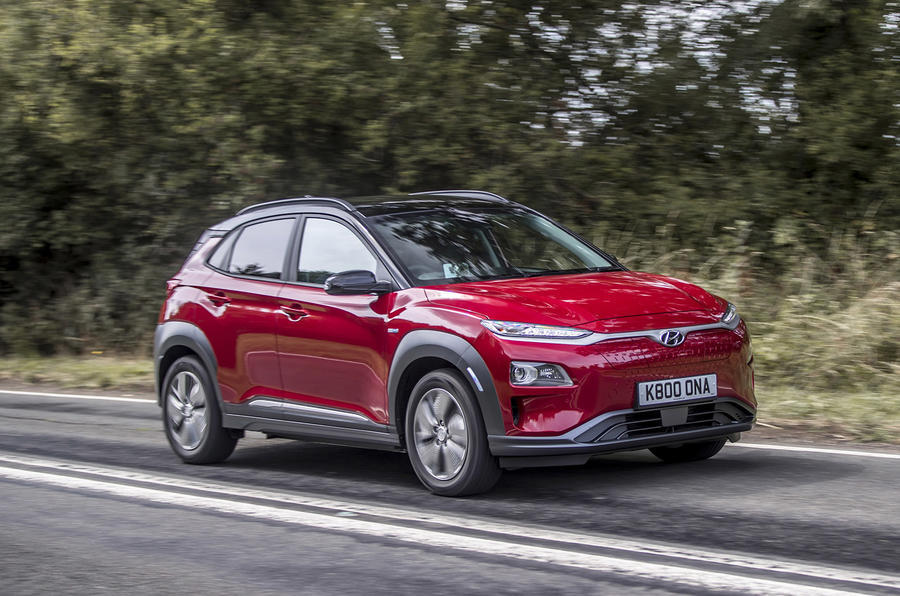
10. Renault Zoe R110, 146 miles
It’s perhaps unsurprising that the affordable Zoe is Europe’s best-selling electric car, but it’s not just price that is on its side. Renault’s city-friendly EV is well-equipped and available with a battery lease programme for anyone looking to offset some of the costs of ownership.
The R110 includes uprated motors which make it more adept at motorway speeds, and while the battery hasn’t grown in size either, it does still manage to outpace the older Q90 version with a real-range figure of 146 miles.
Read the full Renault Zoe R110 review here
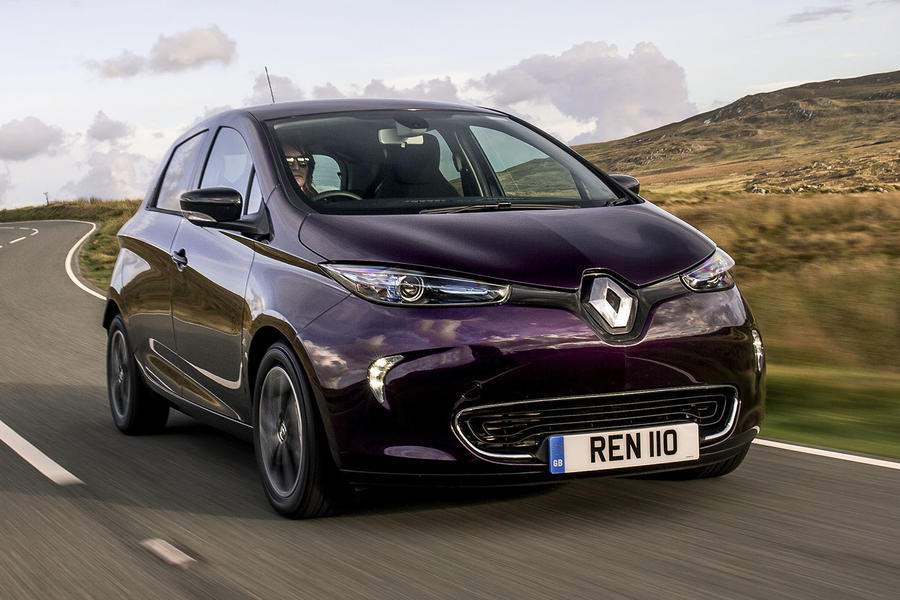
READ MORE
New electric cars 2019/2020: What’s coming and when?
Analysis: Just how green are electric vehicles?
Top 10 Best Electric Cars 2019
Source: Autocar
